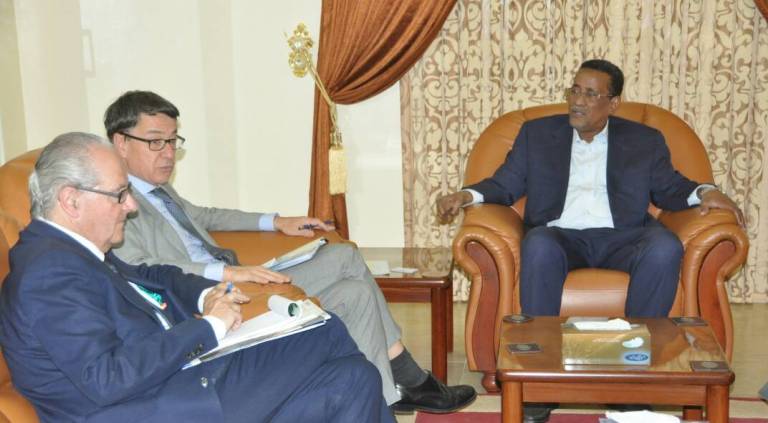EU official discusses peace and democratic transformation in Sudan

July 6, 2017 (KHARTOUM) – The Director of African Affairs Department at the EU, Koen Vervaeke Thursday, has discussed with the Sudanese government, opposition and the civil society peace and democratic transformation issues in the country.
Sudan’s Presidential assistant Ibrahim Mahmoud Hamid has expressed his country’s keenness to promote ties with the European Union (EU) in order to achieve the common interests and enhance cooperation on regional and international issues.
Hamid, who met with Vervaeke Thursday, said he briefed the European official on the overall situation in Sudan and particularly with regard to the national dialogue and the implementation of its recommendations.
In press statements following the meeting, the European official said Sudan has made considerable progress on the internal issues and continues to cooperate constructively with the EU.
He added the dialogue between the EU and Khartoum aims to ensure that Sudan is heading in the right direction to achieve peace, pointing the cessation of hostilities is crucial to continue the national dialogue in order to achieve political solutions and promote human rights and political participation.
Vervaeke pointed that the meeting discussed a number of regional issues and on top of which the situation in Libya, South Sudan, Gulf crisis and the Nile Basin issues.
It is worth to mentions that Sudan has forged a strategic partnership with several European countries and the EU to combat illegal migration and human trafficking.
Sudan has been under EU sanctions since the 1989 coup d’état and didn’t receive any development aid from Europe.
However, the European body reconsidered its position following the waves of illegal migrants from Syria, Iraq, and Horn of Africa countries. Sudan is identified as a source of migrants to Europe and a transit country for migrants from Eritrea, Ethiopia and Somalia.
In April 2016, the EU officially allocated Sudan €100 million to improve the living conditions for refugees, help Sudanese returnees to reintegrate back into society, and to improve security at the border.
In addition to this support, Sudan benefits from additional funding under the EU Emergency Trust Fund for Africa, in particular from a €40 million programme to better manage migration in the region.
MEETING OPPOSITION
Meanwhile, the European official has discussed with representatives from the opposition umbrellas Sudan Call and the National Consensus Forces and the civil society ways to achieve peace and democratic transformation.
Following the meeting, the deputy chairman of the opposition Sudanese Congress Party, Khalid Omer, said the opposition briefed Vervaeke on its stance towards the dialogue, saying the government-led dialogue wouldn’t solve the countries crises.
He added they told the European official the opposition wouldn’t engage in any process that doesn’t address the root causes of the Sudanese problems and achieve real change in the structure of governance.
Omer pointed out that they told Vervaeke that the regime doesn’t have the capacity and the will to achieve stability, saying the Sudanese people have various options to resist the regime.
Since January 2014, Sudan’s President Omer al-Bashir has been leading a national dialogue process whose stated aims are to resolve the armed conflicts, achieve political freedoms, alleviate poverty and the economic crisis, and address the national identity crisis.
Last October, the political forces participating in the national dialogue concluded the process by signing the National Document which includes the general features of a future constitution to be finalised by transitional institutions.
The opposition groups boycotted the process because the government didn’t agree to a humanitarian truce with the armed groups and due to its refusal to implement a number of confidence building measures aiming to create a conducive environment in the country before to hold the inclusive dialogue.
(ST)
